Transferts monétaires sectoriels
Les transferts monétaires peuvent permettre aux personnes en situation de crise de répondre à leurs besoins liés à un secteur spécifique du domaine humanitaire, comme l’eau, l’alimentation, les abris, les moyens de subsistance ou la protection. Les transferts monétaires sectoriels peuvent être affectés ou non affectés, assortis ou non de conditions et ils sont généralement distribués dans le cadre d’options d’aides variées, qui peuvent inclure une aide en nature et une aide sous forme de services.
Chaque secteur doit réfléchir à plusieurs questions et prendre en compte les difficultés, avantages et risques au moment de soutenir la reprise économique des bénéficiaires dans son domaine d’expertise. Ce travail implique de disposer de données probantes, d’outils, de directives et de capacités. Atteindre les objectifs spécifiques à un secteur par le biais des transferts monétaires requiert également une compréhension multisectorielle des besoins et de ce qui constitue la sécurité économique des ménages ; voir la page Transferts monétaires à usages multiples. Alors qu’il existe dans certains secteurs une longue expérience de la mise en œuvre des transferts monétaires, d’autres se tournent tout juste vers cette modalité. La plupart des secteurs humanitaires se sont engagés dans cette voie et ont redoublé d’efforts pour mettre en place des transferts monétaires sectoriels. Le groupe mondial de coordination des clusters coordonne également le travail inter-clusters afin d’accroître l’utilisation sectorielle des transferts monétaires.
Priorités actuelles
Le CALP Network travaille en étroite collaboration avec les groupes techniques/groupes de travail sur les transferts monétaires au sein des clusters mondiaux, qui ont défini leurs priorités et plans de travail pour 2020 lors de leurs réunions régulières. Une vue d’ensemble générale et des détails spécifiques sur ces priorités dans chaque cluster mondial est disponible ici.
Thematic lead
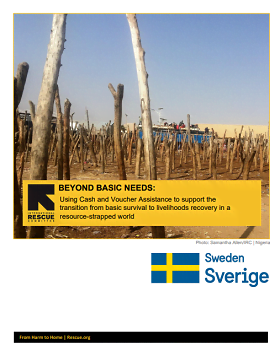
Beyond Basic Needs: Using Cash and Voucher Assistance to Support the Transition from Basic Survival to Livelihoods Recovery in a Resource-Strapped World
Guidelines and Tools
Do you think of yourself as a “cash” person OR as a “livelihoods” person? An “emergency” practitioner OR a “recovery” practitioner? Or do you find yourself unsatisfied with the often narrow implications of these terms? We’ll never have enough funding to provide basic needs support to everyone who needs it for the entire time they are in need, even if we take advantage of the...

Looking into 2020: short overview on global clusters, CVA and the CALP Network
Presentation
Overview as 2020 begins:
• Significant progress and commitment from all global clusters on integration of CVA into their work.
• Significant interest in different regions and by some donors on sector-specific CVA.
• Challenges that remain:
o Dialogue: 1) Ensuring CVA specialists understand sector specificities and successfully bank on the technical expertise emanating...

Building Evidence to inform the Effective Use of CASH and Voucher Assistance in Emergency Sanitation and Hygiene Programming
Report
An analysis of 5 case studies of utilization of CASH/Voucher Assistance are presented and analysed in the attempt of building evidence on their utilization in emergency WASH Sanitation and HP programming. Findings and recommendations are provided on Coordination, Situation and Response Analysis, Program Design, Implementation, Monitoring and Evaluation.
Contenu récent

Voucher Fairs: A Quick Delivery Guide (booklet version)
Guidelines and Tools
A Quick Delivery Guide to using voucher fairs to implement a market-based emergency response. Prepared as a practical tool, this guide provides a brief synthesis of the necessary preconditions and advantages and disadvantages of using voucher fairs. It also provides practical implementation tips. This...

Support to Economic Recovery of Urban Households in Karoi town, Zimbabwe (the CALP Network Case Study)
Report
In the urban area of Karoi, Zimbabwe, Save the Children combined cash for work with livelihoods support to meet the immediate food needs and support the economic recovery of poor families. The project used smart cards to transfer cash to beneficiaries, which proved to be an appropriate payment...
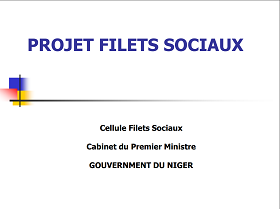
Presentation sur le projet des filets sociaux au Niger
Rapport
Cette présentation donne une introduction au project des filets sociaux au Niger, un projet de 6 ans avec un montant total de $70 millions de dollars. Le projet compose un système de filets sociaux, de transferts d’argent pour la sécurité alimentaire, et des travaux communautaires par le “cash...
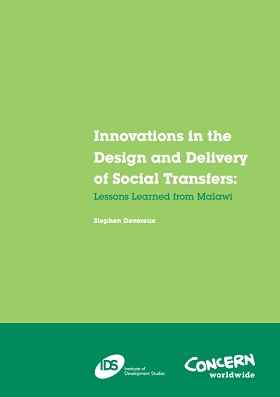
Innovations in the design and delivery of social transfers: Lessons learned from Malawi
Case Study
In 2005/6 and 2006/7, Concern Worldwide in Malawi designed and delivered two emergency social transfer programmes that were evaluated as innovative and effective, and have advanced thinking on best practice and what is feasible, both in emergency contexts and in the delivery of predictable (nonemergency)...
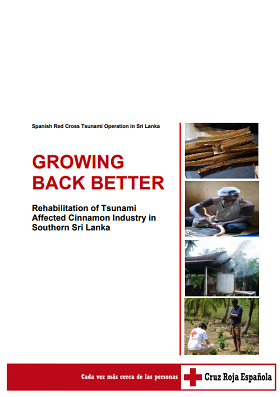
Growing back better: Rehabilitation of tsunami affected cinnamon industry in Southern Sri Lanka
Case Study
This case study looks at the Spanish Red Cross’ intervention in post-tsunami Sri Lanka which aimed at supporting smallholder cinnamon growers, whose fields had been destroyed by the tsunami, to recover and improve their cinnamon production as a way to restore their means of living. Cash grants were...
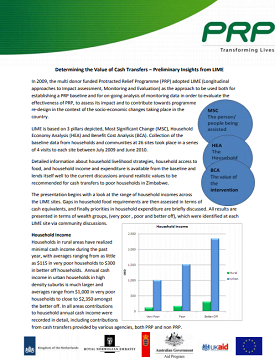
Determining the Value of Cash Transfers – Preliminary Insights from LIME
Report
In 2009, the multi donor funded Protracted Relief Programme (PRP) adopted LIME (Longitudinal approaches to Impact assessment, Monitoring and Evaluation) as the approach to be used both for establishing a PRP baseline and for on-going analysis of monitoring data in order to evaluate the effectiveness of...
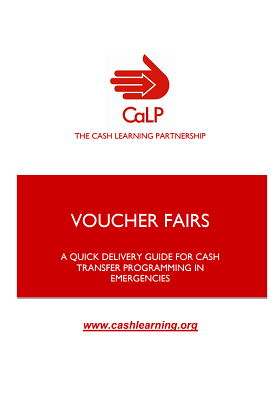
Voucher Fairs: A Quick Delivery Guide (screen version)
Guidelines and Tools
A Quick Delivery Guide to using voucher fairs to implement a market-based emergency response. Prepared as a practical tool, this guide provides a brief synthesis of the necessary preconditions and advantages and disadvantages of using voucher fairs. It also provides practical implementation tips.
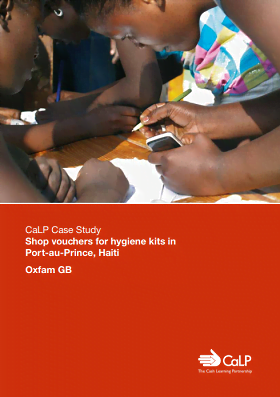
Shop vouchers for hygiene kits in Port-au-Prince, Haiti (the CALP Network Case Study)
Report
In the aftermath of the 2010 Haiti earthquake, Oxfam’s Public Health Promotion team used a voucher programme to provide beneficiaries with essential hygiene items through local shops. The voucher system was chosen so that beneficiaries could access hygiene items in a normal and dignified way, and in...
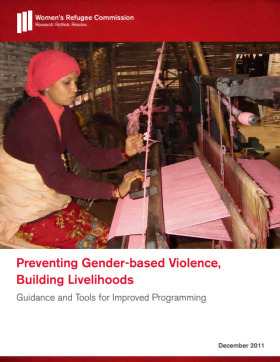
Preventing Gender-Based Violence, Building Livelihoods: Guidance and tools for improved programming
Guidelines and Tools
Conflict and displacement destroy livelihoods and force people to adopt new strategies to support themselves. New livelihood strategies can increase the risk of gender-based violence (GBV). Women often have no safety net; they usually flee with few resources and little preparation and may become...

Oxfam Programme Quality Standards: Cash transfer programmes (CTPs)
Guidelines and Tools
Through its Emergency Food Security and Vulnerable Livelihoods (EFSVL) work, Oxfam aims to meet immediate food needs and protect livelihoods, whilst contributing to the longer term economic recovery of disaster affected populations and increasing their resilience to future shocks. Oxfam believes that...
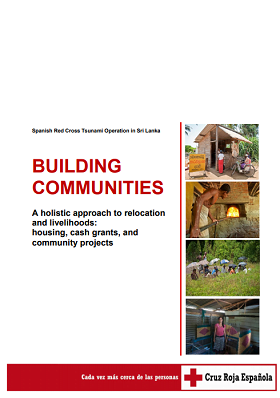
Building Communities: A holistic approach to relocation and livelihoods: housing, cash grants, and community projects
Case Study
This case study looks at the Spanish Red Cross’ housing reconstruction programme which took place between 2007-09 in Sri Lanka, following the devastating Tsunami. In addition to housing this intervention had two main approaches: household level grants for re-starting, supporting the strengthening or...
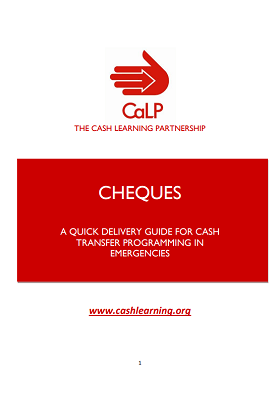
Cheques: A quick delivery guide for cash transfer programming in emergencies
Guidelines and Tools
A Quick Delivery Guide to delivering money through cheques. Prepared as a practical tool, this guide provides a brief synthesis of the necessary preconditions and advantages and disadvantages of using cheques. It also provides practical implementation tips.
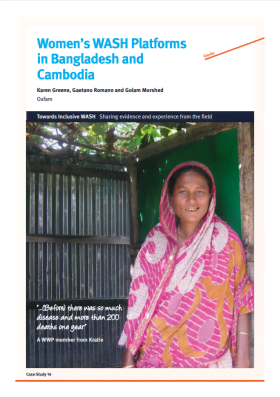
Women’s WASH Platforms in Bangladesh and Cambodia
Case Study
Oxfam’s multi-country portfolio is located in more than 100 remote rural communities in six countries and is funded by AusAID’s Civil Society Organisation WASH Fund. The water, sanitation and hygiene (WASH) projects in Bangladesh and Cambodia deliver multiple outcomes including improving water and...
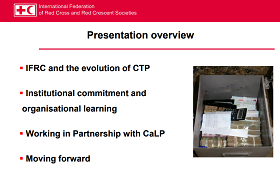
IFRC and the evolution of CTP
Presentation
An IFRC presentation covering the following topics: IFRC and the evolution of CTP Institutional commitment and organisational learning Working in Partnership with the CALP Network Moving forward
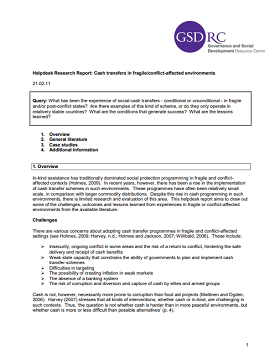
Helpdesk Research Report: Cash Transfers in Fragile/Conflict-Affected Environments
Report
In-kind assistance has traditionally dominated social protection programming in fragile and conflict-affected contexts (Holmes, 2009). In recent years, however, there has been a rise in the implementation of cash transfer schemes in such environments. These programmes have often been relatively small...

Emergency Livelihood Recovery Intervention (ELRI): Fafi District – Garissa County – North Eastern Kenya
Report
The Emergency Livelihood Recovery Intervention (ELRI) was implemented by Horn Relief with funding from OFDA. The Emergency Livelihood Recovery Intervention (ELRI) took place between January 2010 and April 2011; it was designed to address the immediate food security needs of the drought-stricken population...
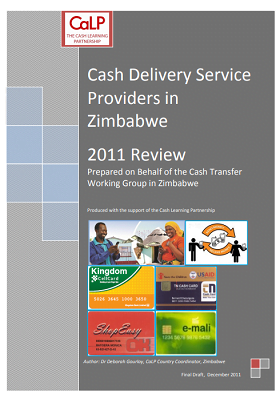
Cash Delivery Service Providers in Zimbabwe
Report
Over the past few years Zimbabwe has witnessed a significant increase in the use of cash transfers within policies and programs providing humanitarian aid. This has resulted is an increasing desire on the part of humanitarian agencies to partner with private sector financial service providers in the...

The Voucher programme in the Gaza Strip – Mid-term review
Report
The WFP voucher project is part of the emergency operation (EMOP 10817.0) to assist the recovery of the population affected by the conflict in Gaza Strip. WFP emergency operation has the following objectives: Meet urgent needs and improve the food consumption for conflict-affected people targeted...
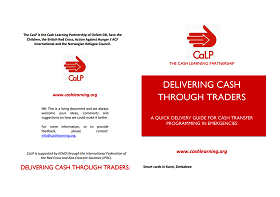
Delivering Cash Through Traders – A Quick Delivery Guide (booklet)
Guidelines and Tools
A Quick Delivery Guide to delivering money through local traders. Prepared as a practical tool, this guide provides a brief synthesis of the necessary preconditions and advantages and disadvantages of using cheques. It also provides practical implementation tips. This version of the Quick Delivery...
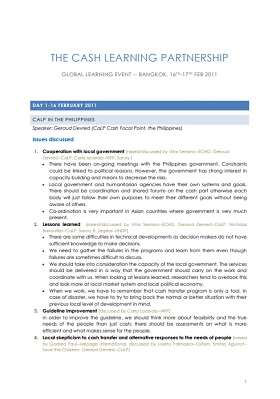
The CALP Network 4th global learning event: Global innovations and lessons learned from response in South and South-East Asia (Complete workshop notes)
Report
The 4th the CALP Network Global Learning Event was held in Bangkok, Thailand on the 16th and 17th February 2011, hosted by the CALP Network in partnership with the International Federation of the Red Cross and Red Crescent Societies (IFRC). This inter-agency event was designed to present the latest...


